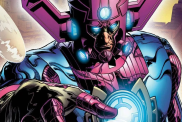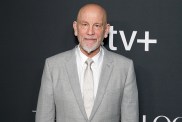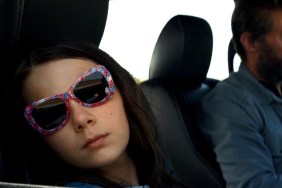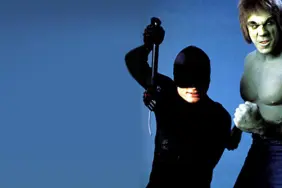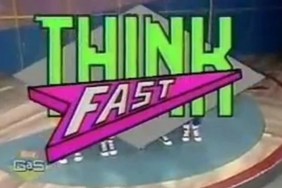
It’s odd to say, but when I think about The Shawshank Redemption I think about love. It’s a dark tale to be sure; of wrongly convicted men (according to the inmates, the prison is chockfull of them), some nasty prison guards, an even nastier warden, institutionalization, prison rape and most robustly, hope. At its core, however, is this story of friendship. And the one between Red and Andy is one of the great friendships in movie history.
It begins formally and specifically and you think you know where it’s all going, but it surprises you along the way and before long a saga unfolds. The film spans many years, characters come and go but there is always Red and Andy. Darkness looms over all the characters in Shawshank and much of the movie is about Andy and Red fighting that darkness. Humor and light-heartedness exist, but around corners in rooms you’re best not found alone, there is something else eating everyone alive. You can’t see it, but you can feel it as the film progresses. Yes, there are a lot of bad men in Shawshank prison, but within those grim walls and the corroding corridors there is no more evil a villain than that of despair.
Andy Dufresne: That’s the beauty of music. They can’t get that from you… Haven’t you ever felt that way about music?
Red: I played a mean harmonica as a younger man. Lost interest in it though. Didn’t make much sense in here.
Andy Dufresne: Here’s where it makes the most sense. You need it so you don’t forget.
Red: Forget?
Andy Dufresne: Forget that… there are places in this world that aren’t made out of stone. That there’s something inside… that they can’t get to, that they can’t touch. That’s yours.
Red: What are you talking about?
Andy Dufresne: Hope.
The journey of the film has been oft-told: it went from obscurity to one of the most popular films of all time in a way very few movies ever have. It was nominated for 7 Academy Awards but walked away with nothing. It was 15 years ago to the day since Frank Darabont‘s The Shawshank Redemption (based on the Stephen King novella “Rita Hayworth and the Shawshank Redemption”) was first released. To call it a prison sentence would be disingenuous, but someone should tell Ted Turner if it plays on TNT one more time I will murder a puppy and it will be his own doing. There is such a thing as overstaying your welcome and I fear this great and beautiful film will get a little played out, vulnerable to cynicism and revisionism. Of course, that’s being over-protective, but this is a film close to my heart.
It made such an impact on me, you can almost say my enthusiasm for it was rabid. I saw it 5 times in the theater and pleaded with anyone I could to come with me. I once e-mailed Roger Ebert, back on his CompuServe site days and asked him why he gave the film 3 1/2 stars rather than 4. From his glowing review I couldn’t for the life of me understand it. He responded in an e-mail, “It took a little too long to end” or something like that. This only infuriated me more. What’s he talking about? I, of course, never wanted it to end. But Ebert made good with my ridiculous grudge when he reconsidered in 1999 and it ending up on his “Great Movies” list.
© Warner Bros., All Rights Reserved
When all is said and done, The Shawshank Redemption – with it’s overly-criticized title – found it’s audience on video. It was the most rented film of 1995. As I write this piece, it sits at number one on IMDB’s user poll of the 250 best films of all-time. How much stock you put into that is up to you, but it’s interesting to note Pulp Fiction, sits at #5 and Forrest Gump at # 42 (both were nominated for Best Picture the same year, the latter film cleaning up). 2007’s AFI list ranks Shawshank as the 72nd best film of all time. Empire Magazine goes 68 spots better and places it at #4, and to top it off, a stage version of the novel premiered a few months ago. I would say “beloved” is an apt description for this film.
I remember the moment the movie really took hold of me. It’s that famous shot where the camera moves in towards the Mansfield State Reformatory, that foreboding fortress doubling as Shawshank prison. The camera then sweeps around the prison yard as the inmates scurry toward the busses dropping off fresh barrels of “fish”. Red and company are about to meet poor Andy Dufresne. The shot is a beauty, but charge Thomas Newman’s amazing, haunting score as an accessory because without it it loses a lot of its power. It gave me chills. It still does. I wasn’t one to pay too much attention to camera work or even the look of a film but Roger Deakins’ cinematography made a lasting impression. I’ve paid attention ever since.

But it’s the characters we remember most. Bob Gunton‘s steely warden likes to quote and hang scripture about his office but his hypocrisies and increasingly corrupt behavior make for a great bastard. Is the a movie stereotype? Why, yes! Gloriously so! In the confines of this picture, he works brilliantly. William Sadler, Mark Rolston, Gil Bellows, James Whitmore and Clancy Brown provide strong support for the two leads: Tim Robbins and Morgan Freeman.
We see Andy through Red’s eyes. Tim Robbins said he played the role as if Andy always had a secret (which he did). The reserved, enigmatic quality about Dufresne could be easily mistaken for shyness or weakness and it’s Morgan Freeman’s Red who is the first to make that mistake. A pack or two of cigs says he’s the first “fresh fish” to break down that night, thinks Red. But when the lights go out and the caged, taunting Shawshank denizens play their reindeer games, it is not the “tall drink of water” that is Andy Dufresne who panics. He never makes a sound. Make that two packs of cigarettes.
I was fifteen when I first saw The Shawshank Redemption and I remember it clearly. My father’s favorite actor has always been Gary Cooper, but back then Harrison Ford was probably the closest thing to Cooper as far as he was concerned. Ford was coming off a string of successes. We’d seen Clear and Present Danger only weeks before and both liked it quite a bit. Hell, we were more than willing to go see it again. Now there was this movie coming out called The Shawshank Redemption and it was playing in a sneak preview. Once upon a time movie studios set up sneak preview double-features (I’ve noticed this is a quickly disappearing act) where you could watch a movie like Shawshank a week or two before its release and stay and watch another movie like Clear and Present Danger (a movie long in release) all the while paying for only one movie.

I didn’t go into it completely blind. I had a legitimate interest in Shawshank. My Entertainment Weekly Fall Movie Preview at the time said it had a shot at some Oscar nominations for Tim Robbins and Morgan Freeman, but that’s about it. I was already a fan of Freeman, but was becoming a pretty big fan of Mr. Robbins (The Player and Bob Roberts were heavily favored in the VHS rotation around that time). Not to mention, I was a huge Stephen King fan (though I had not gotten around to reading “Different Seasons” yet). Long story short, I convinced my dad that it was supposed to be a good movie and off we went.
And in a blink, the end credits rolled. It was a slow turn of the head when my dad and I locked eyes. Wow. I mean, wow! Who was expecting that? Usually we’d be up out of our seats to beat the crowd to the parking lot. Not this time. We sat there and we watched the credits a while, listening to Newman’s score, taking it all in. We were in no rush. Plus, there was Clear and Present Danger, right?
“I don’t think we need to stay for that one.” my dad said giving a chuckle in the end. I laughed too. It was the kind of nervous laugh you get when you’re on a certain kind of high. We knew we just watched not a good movie, but a great one.

And he was right. There was no need for more. At that point, we’d seen the best movie of the year. To stay was to invite disappointment and we didn’t want to associate disappointment with the new Gary Cooper. We left and talked about the movie. My dad pointed out that Clancy Brown is an under-appreciated actor. I nodded in agreement as he drove home. I probably would have agreed with anything my “pa” said that night. It was a good time. But you know, that Clancy Brown is pretty good…
That was the last time my dad and I went to the movies alone together. I’ve been to the movies with my parents since, sure, but that sneak preview of Shawshank was the last time I went to the movies where it was just me and my dad. You grow into a teenager and those things become less important to you and then you grow up some more and they become the most important thing in the world. It could be a baseball game. Or it could be a movie. But those times, they stick.
When I think of this movie, I’m reminded of how classical storytelling and working with archetypes can be just as vibrant and powerful as revolutionary techniques or realistic, understated portrayals. I’m reminded of the level most movies should aspire to; that success can be defined by building around story and character. I’m reminded about what a great, truly great actor Morgan Freeman is, but more than anything – when I think of this movie – I will always think of my father. Like I said, I think of this film and I think of love.





